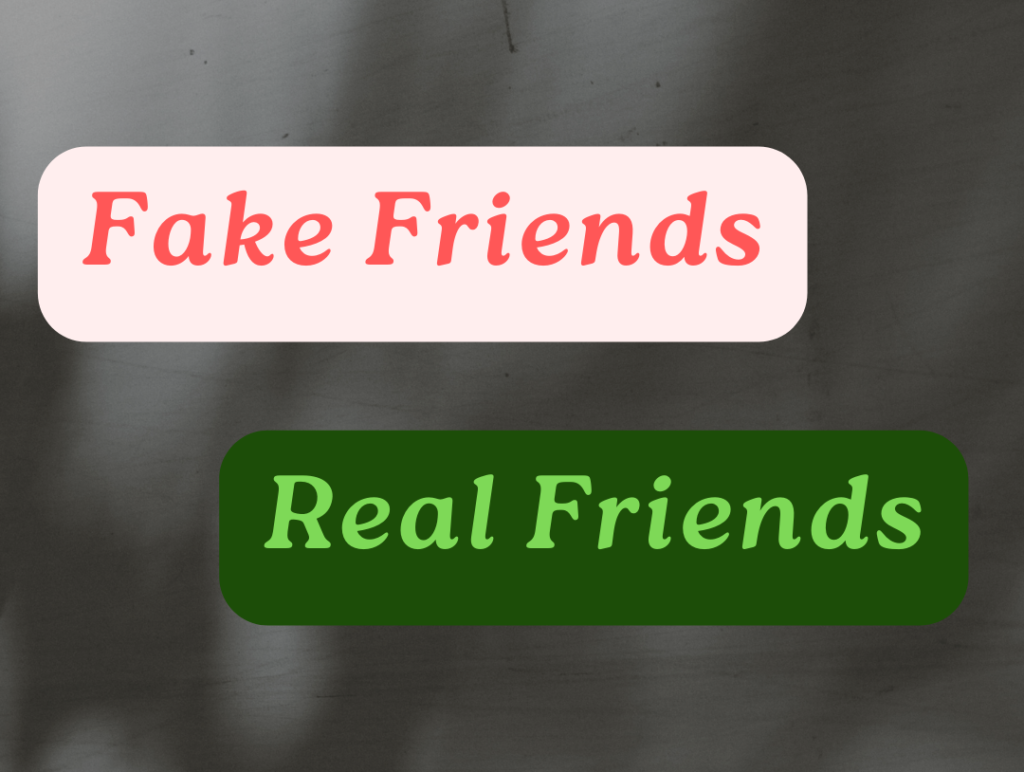
Friendship, a cornerstone of our lives, brings joy, support, and camaraderie. But amidst the genuine connections, there lurk relationships that do not hold the same authenticity. Learning to differentiate between fake friends and real ones can be vital for emotional well-being.
The traits of authentic friendship that nurture genuine bonds are linked to the signals or behaviours exhibited by fake friends because they stand in direct contrast with each other.
Recognising these links helps individuals differentiate between authentic friendships and fake relationships. You can assess how authentic your relationships are and decide whether to nurture or let go of them.
Identifying the Telltale Signs
Red Flags of Fake Friendship:
1. Envious Behaviour:
Fake friends often exhibit envy towards your successes and accomplishments.
Example: Your promotion at work is met with fake enthusiasm. However, they start making subtle comments or downplaying your achievement, expressing how they deserved it more. Their envy becomes evident through passive-aggressive remarks or lack of genuine happiness for your success.
2. Negativity Magnet:
They radiate negativity, always finding fault or dwelling on pessimism.
Example: Whenever you share positive news or aspirations, they immediately point out potential pitfalls or reasons why it will not work. They focus solely on the negative aspects, draining your enthusiasm and creating a pessimistic atmosphere.
3. Gossip Mongers:
Talking behind your back or spreading rumours is a common trait.
Example: You confide in them about a personal matter, and soon after, you hear from others about the details you shared. They spread rumours or talk behind your back, eroding trust and confidentiality in the friendship.
4. Inconsistent Commitment:
Frequent cancellations of plans show their lack of reliability.
Example: They frequently cancel plans at the last minute without valid reasons or with flimsy excuses. Their lack of commitment shows a disregard for your time and the relationship’s importance.
5. Masters of Guilt:
They guilt-trip you into doing things, manipulating emotions for their benefit.
Example: They manipulate situations to make you feel guilty if you do not comply with their requests. For instance, they might say, “I guess I can handle it alone since you’re busy,” making you feel obligated to help despite your own commitments.
6. Constant Competition:
They always attempt to outshine you, and make you feel inferior.
Example: Regardless of your achievements, they always try to outdo you. If you share good news, they immediately boast about something better to regain the spotlight, leaving you feeling inadequate.
7. Passive-Aggressive Traits:
Their communication is often laced with passive-aggressive tones.
Example: They express displeasure or criticism indirectly, often through sarcasm or backhanded compliments. For instance, saying, “Wow, I wish I could be as carefree as you, unconcerned about responsibilities,” when you share your plans.
8. Drama Seekers:
They thrive on drama, creating or fuelling conflicts for excitement.
Example: They thrive on creating or fuelling conflicts in social circles. They may exaggerate stories or intentionally provoke situations to generate drama, finding excitement in chaos.
9. Always Right Attitude:
Disregarding your opinions and asserting their ‘always right’ stance.
Example: In discussions or decisions, they dismiss your opinions or experiences, insisting on their own ‘always right’ stance. They refuse to consider alternative viewpoints, undermining your thoughts.
10. Rotating Friends:
Constantly having new friends around, potentially using people for their gain.
Example: They cycle through friends quickly, constantly introducing new people into their circle without maintaining long-term connections. It becomes apparent they might be using friendships opportunistically for personal gain rather than valuing meaningful connections.
11. Underminers:
They undermine your confidence by making subtle, belittling comments or comparisons that chip away at your self-esteem. They will try to talk you out of your good ideas.
Example: Whenever you enthusiastically share your innovative plans or ideas, these friends consistently find reasons why they will not work. They undermine your confidence in your own abilities or the feasibility of your ideas, discouraging you from pursuing them. Their remarks might seem harmless on the surface but consistently undermine your confidence and self-worth over time.
12. Advocate for stagnation:
They just do not want you to grow and succeed.
Example: You notice that whenever you mention personal growth, career advancement, or any success you have achieved, these friends seem disinterested or dismissive. They might subtly discourage your progress or avoid discussions about your goals altogether, as they might feel threatened by your success.
13. Emotional Drainer:
This type of person tends to drain others emotionally by unloading their problems, dominating discussions, and seeking constant attention without reciprocating support or consideration for others’ well-being.
Example: A friend who constantly reaches out to you to vent about their problems without considering your own emotional capacity or boundaries. Every conversation revolves around their issues, leaving little space for your input or feelings. They might call or message frequently, demanding your immediate attention and emotional support, often ignoring your needs or contributions in the conversation.
14. Unreliable Ally:
They are never there when you need them, and they never defend you. This shows a lack of loyalty or commitment to your friendship.
Example: Whenever you face a challenging situation or need support, that friend is nowhere to be found. They might make excuses or simply not respond when you reach out for help or guidance. That person is also silent or indifferent in situations where you need someone to stand up for you or support your position.
15. Manipulating your instincts:
They affect your instincts and make you second guess your decisions.
Example: A friend of yours always seems to have an opinion or suggestion about every decision you make. Whenever you express your thoughts or plans, the friend tends to offer their perspective, often in a convincing or assertive manner. You find yourself second-guessing your decisions or feeling uncertain about your judgment. Their influence or comments tend to cloud your instincts, making you doubt yourself or your choices.
Recognising these signs in a friendship allows for better assessment and management of these relationships, fostering an environment of healthier, more genuine connections.
Strategies for Managing Relationships With Fake Friends
1. Assess and Reflect:
Take time to evaluate the friendship. Recognise patterns and assess how you feel in their presence.
Example: There could be a pattern where your friend will only contact you when you are needed for something, causing you to feel used and unappreciated. Reflect on how this dynamic affects your emotional well-being and recognises the imbalance in the friendship.
2. Set Boundaries:
Establish clear boundaries. Communicate your limits regarding discussions, time, and emotional involvement.
Example: Establish clear boundaries with your friend by stating that he will not engage in negative gossip or tolerate disrespectful behaviour. Set boundaries also about the amount of time and emotional investment you can offer in the friendship.
3. Limit Interaction:
Gradually reduce interactions with these friends, focusing on nurturing healthier connections.
Example: Gradually reduce your interactions with a friend who always monopolises conversations and never listens to you. Start engaging in activities and spending time with friends who value your opinions and contributions to conversations.
4. Open Communication:
If comfortable, address your concerns openly. Share how their behaviour affects you without accusations.
Example: Openly address your concerns with your friend. Express how his constant criticism affects your confidence. Discuss this in a non-confrontational way, hoping for a positive change in their dynamic.
5. Seek Support:
Discuss your feelings with trusted mutual friends or seek advice from a counsellor.
Example: Confide with a trusted friend who will provide a listening ear and offers advice on how to handle the situation or suggests seeking professional help if needed.
6. Focus on Real Connections:
Invest time in nurturing relationships with friends who reciprocate your care and support.
Example: invest more time and effort into friendships with people who reciprocate your care and support. Nurture relationships with friends who value you and demonstrate genuine interest in your well-being.
7. Practice Self-Care:
Prioritise your well-being. Engage in activities that bring you joy and peace.
Example: prioritises your well-being by engaging in activities that bring you joy and peace. Start a hobby you are passionate about.
8. Learn to Let Go:
Understand that not all friendships are meant to last. Sometimes, letting go is the healthiest choice.
Example: If you cannot satisfactorily address a one-sided and draining friendship, then let go of the friendship. It is better for your mental health in the long run.
Nurturing Genuine Bonds
Traits of Authentic Friendship:
1. Consistent Support:
Authentic friends stand by you consistently, offering unwavering support irrespective of the circumstances. Whether you are facing tough times or celebrating success, they are there to lend an ear, provide encouragement, and help you navigate through life’s difficulties without wavering in their loyalty.
2. Positive Influence:
Genuine friends create a positive impact on your life. They uplift your spirits, inspire you to be your best self, and cultivate an environment where your growth and well-being are encouraged. Their presence brings joy, motivation, and a sense of empowerment into your life.
3. Trust and Confidentiality:
Authentic friendships thrive on trust and confidentiality. Your genuine friends keep your confidences sacred, respecting your privacy and ensuring that the trust you place in them is honoured. They do not share your personal information or secrets with others.
4. Mutual Respect:
In authentic friendships, there’s mutual respect for each other’s opinions, beliefs, and boundaries. Your genuine friends accept you for who you are without judgment or attempts to change you. They respect your values and boundaries, fostering an environment where you feel accepted and understood.
5. Healthy Communication:
Authentic friendships are built on open and honest communication. There is a lack of manipulation, passive-aggressive behaviour, or hidden agendas in conversations. Your genuine friends engage in discussions with sincerity, listening attentively and expressing themselves honestly without causing harm or discomfort.
6. Celebrating Success:
True friends genuinely celebrate your victories and accomplishments. They cheer you on in your successes, sharing in your joy without jealousy or attempts to diminish your achievements. They take pride in your milestones and support your endeavours wholeheartedly.
These traits collectively form the foundation of authentic friendships, creating a nurturing and supportive environment where both parties feel valued, respected, and uplifted.
Conclusion
riends are super important because they make us feel happy and supported. But not all friends are really true. Some seem nice on the outside but do not really care about us. It is important to know which friends real and which ones are not. That means spotting signs like jealousy, being negative, spreading rumours, or not being there when we need them. By understanding these signs and setting limits with our friends, like thinking about how they treat us and how much we share with them, we can handle these relationships better.
Real friends, though, are awesome. They are always there for us, make us feel good about ourselves, and celebrate our successes. They are honest, respectful, and trustworthy. Having these kinds of friends is like finding a treasure because they make life better. So, it is not just about protecting ourselves; it is about finding friends who make us feel happy and safe.
